Brexit & Beyond Newsletter
6 December 2021
Welcome to the 6 December 2021 Brexit & Beyond newsletter
European Commission Vice-President Maroš Šefčovič gave evidence to the Committee for the Executive Office. Executive Ministers took questions in the Assembly on the supply of goods and checks at ports. Legal experts discussed the implications of the use of Article 16. New research has been published by various bodies, including economic modelling on the Protocol, and MPs’ views of the agreement.
Maroš Šefčovič at Committee for the Executive Office
European Commission Vice-President Maroš Šefčovič appeared before the Committee for The Executive Office on Wednesday 1 December. He said the Protocol on Ireland/Northern Ireland is “not perfect, but it is the best response to the UK’s decision to withdraw from the EU and the form of Brexit the Government has chosen.” He said the EU has made “an important move towards the UK with far-reaching proposals…We need the UK Government to reciprocate this now”.
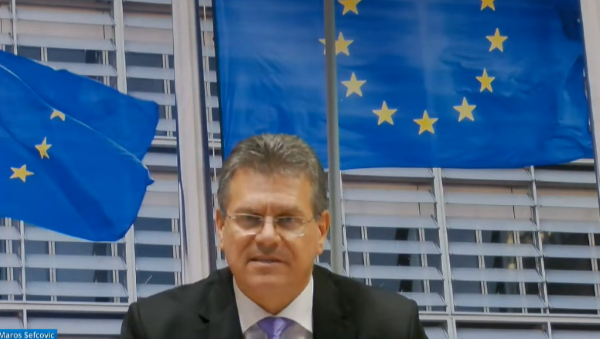
Vice-President Maroš Šefčovič addressing the Committee on Wednesday | Source: NI Assembly
Šefčovič pointed to recent economic statistics from the Office for National Statistics, which, he says, demonstrate the opportunities for NI and its dual market access. He added that this, along with the other positive qualities of NI, has “created something of a positive investment buzz among international investors.” He referred to the importance of the ‘Levelling Up’ agenda for the UK Government, and said “I think levelling up is indeed happening.”
The transparency of the Protocol’s governance structures and a greater role for NI stakeholders and representatives were “discussed at length” on Šefčovič’svisit to Belfast in September. He noted that the First Minister and deputy First Minister always have a chance to speak at the Joint Committee. He referred to proposals in the EU’s non-paper on inter-parliamentary cooperation and said it would be good to find solutions “within the UK on how it would be more appropriate for these discussions to take place”. He added that the EU is suggesting a special consultative process for NI on current or future legislative proposals, “where we would pay particular attention to your comments in our public consultations”. He concluded: “I really would like to reassure you on our goodwill to be as close to you as possible, as acceptable to the UK Government.” Šefčovič added that currently the focus of negotiations is on other topics.
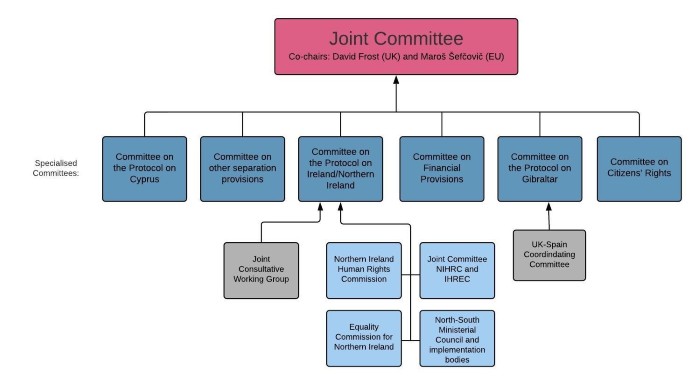
Governance structure for the Withdrawal Agreement and Protocol on Ireland/Northern Ireland
Šefčovičagreed that the issues around medicines require urgency: he said the EU had found a solution “which ticks all the boxes which are important”. He would prefer if the UK and EU could present these solutions as a joint approach, but said, “I know that time is running out...I have to be very clear that we are ready to move on our own.”
Responding to questions about the concerns of civic and political unionism, Šefčovič pointed to the articles in the Protocol which say it respects the territorial integrity and constitutional arrangements of the UK. He said they want to deliver solutions which work for all communities: “We have no hidden agenda…we just want this problem to be solved…we want to ‘get Brexit done’.” Regarding the lack of cross-community consent for the Protocol, Šefčovič said, “(to use the preferred language of our UK partners) as sovereign equals, we democratically negotiated, approved, and ratified the Withdrawal Agreement and Protocol on Ireland/Northern Ireland.” He said he was conscious of concerns among the unionist community and said he is trying to show that they have good answers to these.
Asked if the EU is prepared to remove so many checks, why they sought them in the first place, Šefčovič said they are not abolishing the checks, but trying to reduce them in a “very creative manner”, using IT and databases. He added that things would work more smoothly if the EU gets real time access to IT systems.
Ongoing negotiations
UK Brexit Minister Lord Frost and Vice-President Šefčovič met again (virtually) on Friday 3 December. Lord Frost said the gap between their positions is “still significant” and progress in many areas “quite limited”. He stated that there was “some potential convergence on the medicines issue but agreement has not been reached. We have been unable so far to consider all the detail of the EU’s proposals in the way we need to for this sensitive, critical and highly technical area”. Šefčovič said it was “time to get medicines across the finish line and show strong political will to advance on the rest”. The two will meet again on Friday. Irish Foreign Minister Simon Coveney has said a deal before Christmas is “unlikely but possible”.
Brexit at the Assembly
Supply of goods
On Monday 29 November, First Minister Paul Givan was asked about supply problems for building contractors in relation to the Protocol. He said, “That is not unique to Northern Ireland. I have no doubt that the protocol has had implications for accessing goods. However, there is a worldwide demand on goods, particularly timber.” He said the Executive has agreed to a more flexible approach for procurement. He was also asked about the supply of kosher meat for the Jewish community. The First Minister said they have raised this issue with UK Secretaries of State: “Disturbingly, when they have raised it with Europe as being a result of the Protocol, they have been alarmed at the response that they have had, and, at times, the dismissive nature and lack of understanding of the impact that it is having on the Jewish community.”
Checks at ports
The Minister for Agriculture, Environment and Rural Affairs was asked about moving animals for livestock shows in GB. He said, “the European Union has made it incredibly difficult for people who show livestock in Great Britain. That has been hugely damaging to the pedigree sector…My veterinary officials have proved to the European Union, beyond all reasonable doubt, that this causes no danger, impact or harm to the European Union's single market and, therefore, at this stage, any potential delays are political delays.”
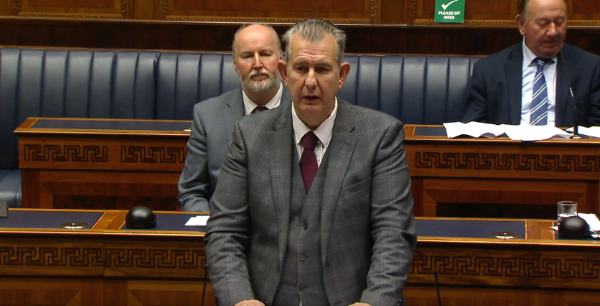
Minister for Agriculture, Environment and Rural Affairs Edwin Poots taking questions from MLAs | Source: NI Assembly
The Minister said he has enough veterinary staff to carry out checks but added that he does not consider it a “good use of a veterinarian's time” to check a groupage lorry for a store which does not have a base in the Republic of Ireland. Minister Poots said, “I have indicated that I am happy to assist the European Union to ensure that goods with the potential risk of entering the Republic of Ireland are checked on its behalf. They should pay for that…that should be separated from the goods that are to remain in Northern Ireland.”
British-Irish Council
On Tuesday 30 November Minister Poots made a statement on the British-Irish Council which met in November. Minister Poots raised the Protocol with other ministers at the summit, including Michael Gove: “It is important that the message continues to be put that the protocol as it currently exists is damaging to Northern Ireland and that we need to find a way through that not only safeguards the European Union's single market but protects the integrity of the internal UK market.” Asked whether he would promote the benefits of NI’s dual market access at the next meeting, Minister Poots said, “I have always indicated that there was an advantage from the protocol but that that advantage was outweighed by the disadvantages.”
Legal experts discuss Article 16
On Wednesday 1 December, the Lords Protocol on Ireland/Northern Ireland Sub-Committee heard from experts on the implications of using Article 16, and other legal aspects related to the Protocol. Dr Sylvia de Mars of Newcastle University said it is almost impossible to predict how the EU will react, should the UK trigger Article 16 - this largely depends on what action the UK takes. George Peretz QC added that a possible domestic legal challenge in Northern Ireland or England to the invocation of Article 16 could add to the complexities. Competition lawyer James Webber pointed out that the EU would be obliged to ensure that their rebalancing measures are proportionate.
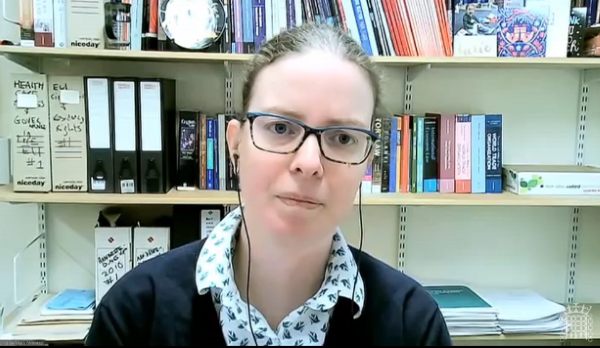
Dr Sylvia de Mars of Newcastle University | Source: UK Parliament
Witnesses agreed that Article 16 was most likely to be invoked in relation to diversion of trade – under Article 5 (on customs and movement of goods) or 7 (technical regulations) of the Protocol. Webber noted that legal arguments about diversion of trade are “murkier” and societal difficulties are not defined in the Protocol. Peretz argued that one has to consider the counterfactual: would societal difficulties be better or worse without the Protocol? This, he said, is “not an entirely easy question”.
Peretz highlighted problems with the EU’s proposals on medicines and noted that a surprising amount of medicines are smuggled across the world: although medicines are strictly controlled under the NHS, this is not true for all medicines. Peretz said the problem of a democratic deficit was “absolutely obvious” on the face of the Protocol, which was why the Government inserted some consent provisions. De Mars added that the EU can, and should, go further regarding engagement for Northern Ireland in the Protocol, pointing to Norway’s arrangements in the EEA agreement.
Other news
- The Court of Appeal in Belfast has heard a legal challenge to the Protocol on Ireland/Northern Ireland. The High Court dismissed the initial challenge and ruled that the Protocol had impliedly repealed part of the Act of Union. The BBC has an overview of the arguments put forward in the appeal.
- The Scottish Cabinet Secretary for Constitution, External Affairs and Culture Angus Robertson has written to its Committee regarding Common Frameworks. A recent quadrilateral meeting endorsed a text on exclusions from the market access principles in the Internal Market Act for divergence agreed under a Common Framework. Robertson states that this “does nothing to lessen the Scottish Government’s opposition to the Act”. He points out that “final decision making lies with UK Ministers alone. That is fundamentally inconsistent with the principles and practice of devolution.”
- On Tuesday 30 November, a Westminster Hall debate was held on UK-EU fisheries allocations post-Brexit. Jim Shannon MP(DUP) opened the debate. On the EU-UK Trade and Cooperation Agreement, he said, “a deal was struck with the EU that ignored fishery access issues around the island of Ireland.” He added, “it is ironic that if the protocol is implemented in its entirety, every time a locally owned fishing vessel, based in a local harbour such as Portavogie in my constituency, returned to its home port in Northern Ireland, it would have to comply with EU regulations requiring it to act as though it came from a third country.” Minister of State Victoria Prentis said the Government is “in the middle of annual negotiations [with the EU], where we think we will be able to secure the fishing opportunities we need.”
- The British-Irish Intergovernmental conference met on 2 December. The conference covered a wide range of issues, including East-West matters, legacy, and economic cooperation. The conference “emphasised its support for the ongoing functioning of the devolved administration in Northern Ireland and underlined the importance of all of the Belfast/Good Friday Agreement institutions.”
- HMRC is reminding GB businesses and traders that full customs controls will be introduced on 1 January 2022 for its border with the EU. Further changes will be introduced in July 2022, including full safety and security declarations for all imports, Export Health and Phytosanitary Certificates. The full implementation of the UK’s Border Operating Model – its post-Brexit border control processes with the EU - has been delayed several times.
Research on the Protocol and EU-UK relations
- The Fraser of Allander Institute (University of Strathclyde) has published economic modelling on the Protocol, asking “can Northern Ireland enjoy the best of both worlds?”. It finds that increased trade friction between NI and GB has a significant negative impact on the NI economy, compared to a no-Brexit scenario. If trade between NI and the EU increases, it finds a reduced economic hit: “Whilst this is no evidence that the NP[the Protocol] allows NI to enjoy the best of both worlds, as the region is still worse-off than pre-Brexit, it demonstrates how NI can take advantage of the new trading regulations to mitigate the negative impacts of Brexit.”
- The UK in a Changing Europe think tank has published a briefing on MPs’ views on policy issues, based on a poll conducted between June and August 2021. It finds that the Protocol on Ireland/Northern Ireland is more popular in NI than among MPs in Westminster, with 59% of Labour and 53% of Conservative MPs saying it is a bad thing for Northern Ireland. The figures are similar when MPs are asked whether it is an “appropriate means for managing the effects of Brexit on NI”. QUB Professors Katy Hayward and David Phinnemore comment on the findings in the New Statesman.
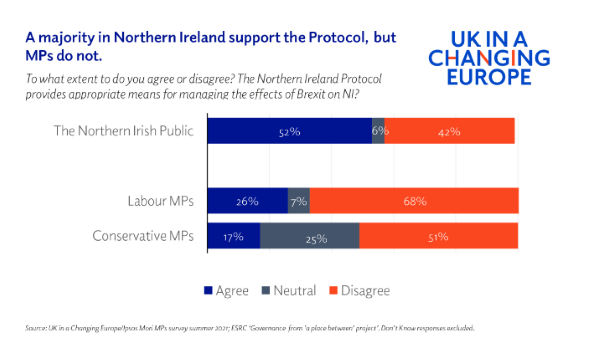
Research from the UK in a Changing Europe think tank | Source: UK in a Changing Europe
- The Senedd Research team has published a piece, ‘A seat at the table: representing Wales in the new UK-EU relationship’ which considers direct contact between Wales and the EU and the role of devolved administrations in the governance structures of the EU-UK Trade and Cooperation Agreement. It notes that the Welsh Minister for Economy has asked to attend Joint Committee meetings as an observer, “when matters relating to Northern Ireland are discussed, given their implications for Welsh ports”. This request has been denied. The Senedd has also published a quick guide to Article 16.
- The Commons Library has a new briefing on Pet travel after Brexit.
This Week at the Assembly
- Monday 6 December, 2pm – Plenary - Question Time - Economy
- Tuesday 7 December, 2pm – Plenary - Question Time – Finance; Motion - The draft Direct Payments to Farmers (Simplifications) Regulations (Northern Ireland) 2022
- Wednesday 8 December, 3.30pm - Committee for The Executive Office - Civic Engagement and the EU - Oral Briefing from the Centre for Cross Border Studies
Catch up with Assembly Business
- Monday 29 November, 2pm – Plenary - Question Time: The Executive Office; Agriculture, Environment and Rural Affairs
- Wednesday 1 December, 10am - Committee for Infrastructure - EU Exit legislation
- Wednesday 1 December, 3.15pm - Committee on Procedures - Legislative Consent Motions - Briefing by RaISe; Section 6A Consent Decisions - Update
- Wednesday 1 December, 4.30pm - Committee for The Executive Office - UK Exit from EU - Oral Briefing from European Commission Vice President Maroš Šefčovič




